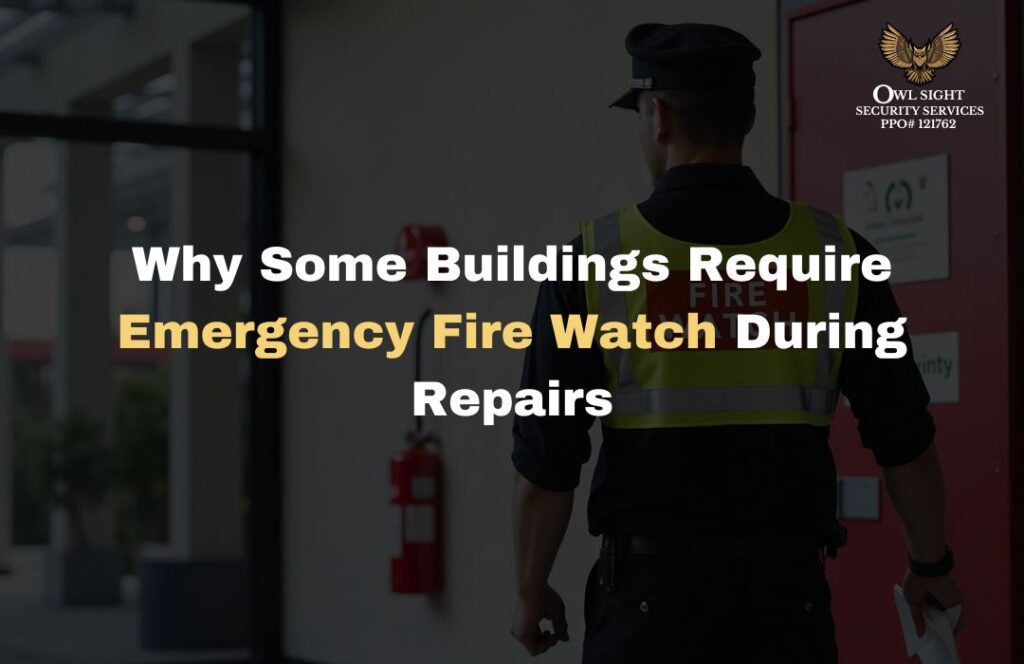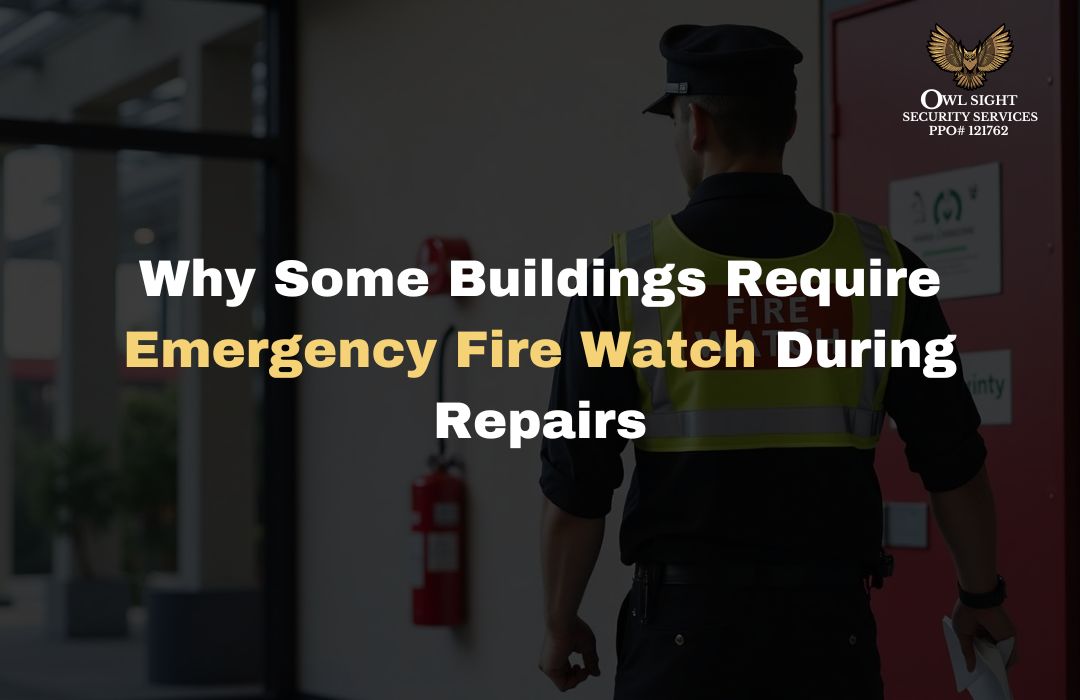
Many properties undergo scheduled maintenance, upgrades, and unexpected repairs that involve fire alarm systems, sprinklers, or other fire protection components. Understanding when buildings require emergency fire watch helps owners maintain safety and comply with regulations during these periods. When a system goes offline, the structure becomes more vulnerable to hazards. Proper oversight minimizes risk. Timely intervention supports safe operations.
Fire protection systems such as alarms, sprinklers, and detection sensors play a significant role in preventing catastrophic losses. However, when these systems fail or are temporarily disabled, buildings cannot rely on their automated defense mechanisms. This is where fire watch requirements during system maintenance or shutdowns become essential. Protecting occupants and property requires real-time monitoring. Human oversight replaces system functions during downtime.
Cities like Long Beach enforce strict fire safety rules to prevent accidents during repair periods. Property managers, contractors, and facility operators are responsible for maintaining compliance until systems are restored. Knowing how and when to implement a fire watch protects buildings from legal liability and reduces operational disruptions. Strong planning ensures safe conditions. Prepared teams maintain operational continuity.
Why Fire Systems Become Disabled During Repairs
Fire systems are complex networks of alarms, sprinklers, panel connections, and sensor devices. During upgrades or repairs, technicians often shut down portions of the system to avoid accidental activations or electrical risks. This creates periods when buildings require emergency fire watch to ensure safety is maintained manually. System shutdowns temporarily remove automated fire detection. Manual supervision becomes necessary.
Repairs may involve replacing outdated components, rewiring control panels, or inspecting damaged equipment. These tasks must be performed with system power turned off. Although the shutdown is temporary, the building loses its ability to detect smoke or initiate alarms. During these windows, fire risks become more serious. Temporary vulnerabilities require structured monitoring. Compliance ensures safe operation.
In other cases, repairs become urgent due to unexpected system failures. Faulty wiring, water damage, or panel malfunctions can cause sudden outages. When these disruptions occur, fire watch requirements during system maintenance or shutdowns immediately take effect. Facility managers must respond to maintain fire safety and comply with local regulations. Quick action protects occupants. Prompt measures sustain building security.
Understanding When Fire Watch Becomes Mandatory
Different jurisdictions have specific rules outlining when buildings require emergency fire watch. In many cities, a fire watch becomes mandatory if alarms or sprinklers are offline for any period beyond a set time limit. This time frame is often one hour in commercial buildings and four hours in residential structures. Once these limits are reached, a trained fire watch must be deployed. Timely response ensures code compliance.
Buildings with vulnerable populations such as hotels, senior communities, medical centers, or high-rise structures often have stricter requirements. Because evacuation can be more challenging in these environments, fire watches must be implemented quickly and maintained until full system functionality is restored. Higher-risk environments demand faster response. Structured monitoring protects vulnerable occupants.
Local fire departments may also require a fire watch during special operations such as hot work, equipment testing, or construction near flammable materials. These activities increase the chance of fire starting, even when systems remain online. A professional fire watch reduces the risk by observing potential ignition sources. Extra precautions ensure safer conditions. Continuous monitoring supplements system performance.
The Role of Professional Fire Watch Security Guards
One of the most effective ways to meet fire watch requirements during system maintenance or shutdowns is to hire professional fire watch security guards. These trained personnel monitor properties continuously, identify hazards, and ensure fire safety is maintained while systems are offline. Their presence compensates for the temporary loss of automated detection. Human oversight strengthens building monitoring.
Teams offering fire watch security guard services in Long Beach are familiar with local codes and procedures. They understand what the fire department expects, how to document patrols, and how to respond if an emergency occurs. Their training ensures correct implementation during outage periods. Local knowledge enhances compliance. Trained staff support safe operations.
Professional guards follow scheduled patrol routes, inspect the building interior and exterior, and ensure that any signs of smoke, unusual odors, or overheating equipment are addressed immediately. Their documentation provides proof of compliance during repairs. Organized reporting supports regulatory requirements. Detailed logs ensure accountability.
Patrol Documentation and Reporting
Fire watch personnel must record every patrol, document observations, and report hazards immediately. This documentation serves as official evidence of compliance and can be reviewed by fire inspectors at any time. Proper reporting protects property owners.
Risks That Increase During System Shutdowns
Buildings are more vulnerable when fire protection systems are disabled. Without alarms or sprinklers, small ignition sources can escalate rapidly. These risks highlight when buildings require emergency fire watch because fire hazards grow significantly during repair periods. Manual observation compensates for the inactive system. Increased vigilance prevents incidents.
Electrical repairs, construction equipment, and temporary wiring create additional hazards. Maintenance teams often work with tools that can generate sparks or heat. Without operational detection equipment, these risks must be closely monitored. Fire watch guards provide immediate oversight. Active monitoring reduces risks.
Vacant or partially occupied buildings are especially vulnerable. With fewer people inside, early identification of a fire becomes more difficult. A fire could grow unnoticed for extended periods. Implementing a temporary fire watch helps maintain visibility throughout the structure. Extra coverage improves detection. Constant monitoring strengthens building readiness.
How Fire Watch Improves Overall Property Safety
A comprehensive fire watch does more than just meet legal requirements. It also provides valuable protection for the building and everyone inside. Understanding fire watch requirements during system maintenance or shutdowns helps property managers see the broader benefits. Continuous presence ensures hazards are quickly recognized. Proactive monitoring strengthens safety measures.
Fire watch personnel identify malfunctioning equipment, blocked exits, or unsafe conditions that may worsen during outages. Their patrols offer an added layer of prevention. This allows managers to address issues immediately. Physical inspections enhance hazard control. Rapid action maintains safe conditions.
Fire watch teams also help maintain order during emergency situations. If a fire is detected, they initiate evacuation, contact emergency services, and help guide occupants to safe locations. Their rapid response shortens reaction times. Immediate action reduces potential damage. Trained supervision improves emergency readiness.
Partnering With Professional Security Providers
Working with a reputable security guard company ensures that fire watch personnel are fully trained and capable of meeting regulatory expectations. These companies provide fire watch teams familiar with building layouts, hazard identification, and local fire codes. Professional support ensures accurate implementation. Reliable staffing maintains continuous coverage.
Security teams offering security services in Long Beach can also provide additional support such as access control, perimeter monitoring, and after-hours protection during system outages. These expanded services help maintain order while fire protection systems remain offline. Combined oversight enhances property stability. Strong support reduces operational gaps.
Choosing professional fire watch support reduces the risk of delayed responses and missed hazards. Skilled personnel ensure that every area of the building is monitored consistently. When the fire system is restored, guards provide documentation confirming compliance throughout the outage. Structured operations maintain building integrity. Professional assistance improves continuity.
Conclusion
Understanding when buildings require emergency fire watch allows owners and managers to act quickly during repair periods. When alarms or sprinklers are offline, real-time monitoring becomes essential to prevent major hazards. Immediate implementation ensures that fire safety remains intact. Strong decision-making supports secure building operations.
Learning fire watch requirements during system maintenance or shutdowns helps property teams create structured plans that align with local regulations. Professional monitoring, consistent patrols, and proper documentation all contribute to a safer environment. These strategies help maintain operational stability until systems are fully restored. Proactive oversight strengthens long-term building safety.
For dependable fire watch support, contact Owl Sight Security Services at 818-818-3307 to request a quote. Our team provides trained personnel, continuous monitoring, and emergency readiness through professional coverage across Long Beach and beyond.




